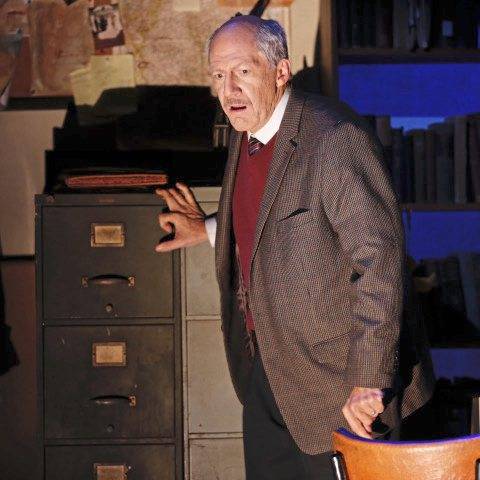He is nicknamed the “Jewish James Bond.”
Simon Wiesenthal survived 12 Nazi concentration camps and made a name for himself by doggedly hunting down and bringing to justice Nazi criminals, including Adolf Eichmann.
Now he is the subject of a one-man, one-act play called “Wiesenthal: Nazi Hunter” opening Tuesday at the August Wilson Center and continuing for three performances through Thursday plus a free student matinee. “Wiesenthal” is donating a portion of the proceeds to help rebuild the Tree of Life synagogue.
The playwright and star of “Wiesenthal” is Tom Dugan, an Irish Catholic from New Jersey.
Dugan said part of the inspiration for the script was his father, Frank Dugan, a decorated World War II veteran who liberated the Langenstein concentration camp. Dugan married a Jewish woman and has two Jewish sons which gave him the confidence to play this Jewish icon.
“Tolerance is something that I’ve benefited from in a great way,” Dugan said in an interview. “So, between my father’s experience as a liberator and my experience as a welcomed outsider in a Jewish community, performing and writing a play about tolerance comes in a very comfortable place for me.”
“Wiesenthal: Nazi Hunter” has been playing to sellout crowds since 2014. It has been nominated for the two most prestigious off-Broadway awards, the Outer Critics Circle Award and the Drama Desk Award.
The play changed its tour dates to come to Pittsburgh earlier in its run to help with efforts to rebuild the heavily-damaged Tree of Life synagogue following the Oct. 27 massacre that left 11 Jews dead.
“When you have a Jewish themed play about tolerance that has been so well received in the U.S. and across the world, it’s not hard to connect dots,” said Dugan. “In a situation like Tree of Life, people want to come and help. With ’Wiesenthal,’ we can give concrete help in these awful circumstances.”
Family owners of Panera, Einstein Bros. Bagels admit Nazi past
Wiesenthal, who lent his name to the Simon Wiesenthal Center in Los Angeles, was involved in the prosecution of hundreds of Nazi criminals. He mostly worked alone in a tiny office, using historical documents, old address books, and telephone directories as his sources. In addition to Eichmann, Wiesenthal helped bring to justice Hermine Braunsteiner-Ryan, a guard at the Majdanek death camp, and Franz Stangl, commandant of the Treblinka and Sobibor death camps.
“He was able to lessen his survivor’s guilt by being able to bring perpetrators to justice,” said Dugan.
Despite what Wiesenthal’s story and work is all about, Dugan said it’s important to note that this is not a dour play.
“It’s not just another Holocaust survivor is going to tell a bunch of sad stories, although it has that element to it,” said Dugan. “He is so charming. Wiesenthal had an amazing sense of humor. The play has won awards because of its ability to keep the listener listening and the audience comes out of the theater uplifted and shocked that they’ve laughed as much as they have cried during the ninety minute performance.”
Dugan said what he most wants the Pittsburgh audience to get out of this play is an understanding that this is not ancient history, something he admitted they may already realize because of the tragic events at Tree of Life.
“The most important point we can make with this play is that the human savage still lurks just below the wafer thin veil of civilization, and how we must recognize that everyone is capable of these evil acts,” said Dugan. “If we can recognize the dark side in ourselves, then we can more readily recognize it in others. That is the most important point of the entire play.”
Wiesenthal is a 90-minute play with no intermission. Performances are at 7:30 p.m. on Tuesday, Wednesday and Thursday with a portion of the proceeds going to the Tree of Life Rebuilding Fund.











